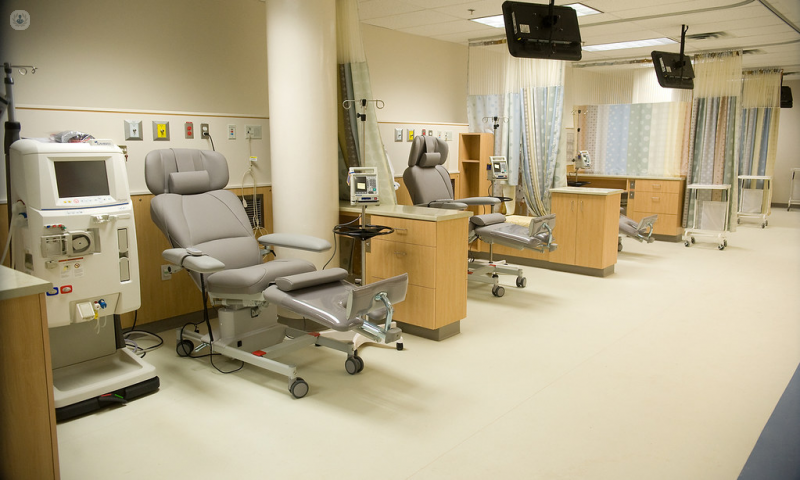Renal failure: dialysis vs. kidney transplant
Escrito por:Renal failure is a potentially life-threatening consequence of long-term kidney disease. When the kidneys fail, there are two key treatments to save the patient and keep their blood filtered. Dr Andrew Palmer explains the pros and cons of dialysis and kidney transplants.

What are the advantages and disadvantages of dialysis?
Patients with progressive chronic kidney disease eventually reach a stage when they have insufficient kidney function to sustain life, becoming increasingly symptomatic, and will eventually die as a result what is termed end-stage kidney failure. This often occurs quite late in their illness as we have considerable reserves of kidney function and usually it only becomes a major issue when kidney function (GFR, or glomerular filtration rate) falls below 20% and a significant proportion of patients only start dialysis at approaching 10% or less.
The principal advantage of dialysis is, therefore, that unless someone receives a transplant first, it is a life-saving treatment. It will also reverse the symptoms and treat the complications of kidney failure, which are often non-specific and include lethargy, loss of appetite/weight and fluid retention.
The disadvantages of dialysis are that it is only a replacement of natural kidney function and, in the case of haemodialysis, an intermittent treatment, and can never be more advantageous than natural native kidney function. It also has all the issues that come with doing the treatment, whether it be peritoneal or haemodialysis on a machine.
Which patients would dialysis be most suitable for?
In most patients, transplantation would be the preferred treatment option and therefore dialysis really is only more suitable when patients cannot be considered for transplantation.
Patients may not be suitable for transplantation for a number of reasons, including other underlying medical problems such as malignancy, severe heart disease, chronic infection, or because they are just insufficiently fit, which naturally becomes more of a problem with age. Some patients are also excluded because their underlying kidney disease is likely to recur or because they have developed antibodies to foreign tissue antigens from pregnancy, transfusion, or previous failed transplants. In all these groups dialysis becomes the first choice treatment.
What are the advantages and disadvantages of kidney transplant?
Kidney transplantation is usually considered the treatment of choice. In patients with end-stage renal failure, there is good evidence that patients with a successful transplant have better survival rates and less likely to be admitted to hospital and have other complications that are mutual to dialysis, such as bone disease.
It also means that patients do not have all the restrictions that go with dialysis including tight control of fluid intake (approx. 750 mls/day), dietary restrictions and the logistical issues of either attending hospital three times a week or doing their dialysis at home. It also makes travel more difficult, although not precluding it. It does, however, initially require a significant operation and, just as importantly, taking potent immunosuppressive medication with its associated side-effects including susceptibility to infection. It should always be remembered that taking such medication is life-long to prevent loss of the transplant from rejection.
Which patients would kidney transplant be most suitable for?
One would normally regard transplantation as the first-choice treatment for all patients that do not have reasons that preclude their suitability. It means that it is easier for patients to return to work, travel and lead a busy life with less interference. Most importantly, it means that ladies of child-bearing age can have successful pregnancies, which is almost impossible on dialysis.
Visit Dr Palmer’s Top Doctors profile to book an appointment.


